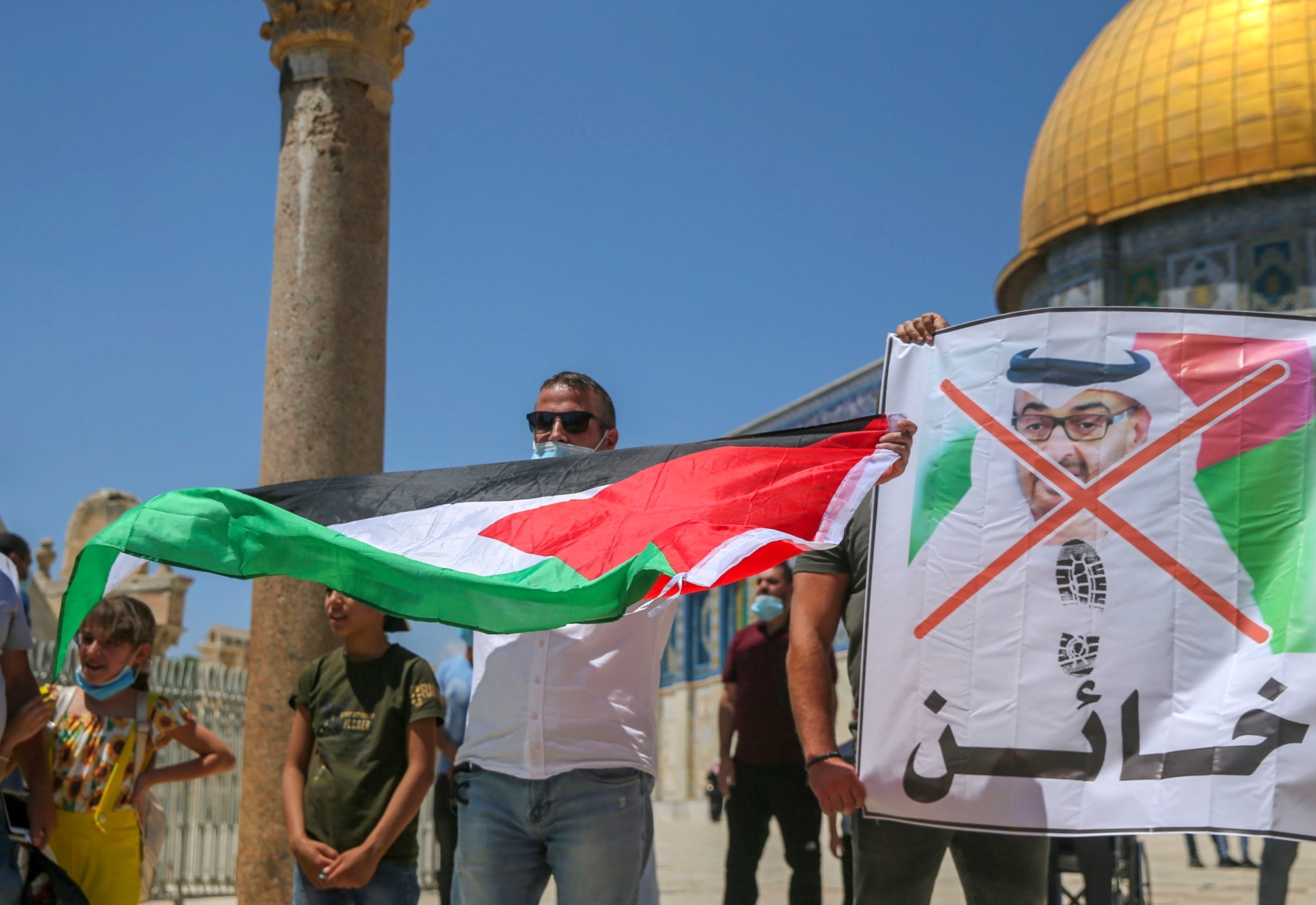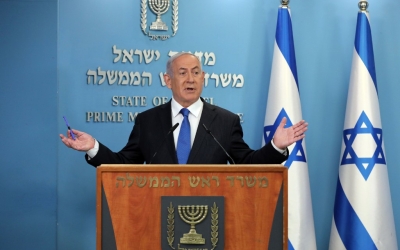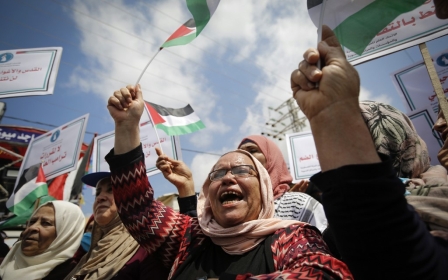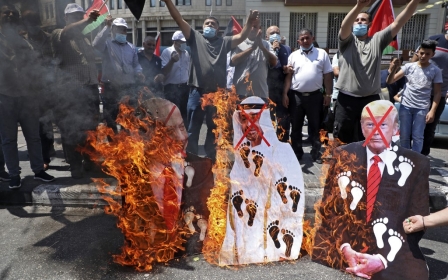Israel-UAE deal: In Jerusalem, Palestinians feel betrayed but not surprised

Since the official announcement on Thursday that an agreement had been reached between Israel and the United Arab Emirates (UAE) normalising diplomatic relations, news has kept coming in of new projects and opportunities between the two countries.
One such announcement was the news on Monday that Israeli President Reuven Rivlin had officially invited the Crown Prince of Abu Dhabi Mohammed bin Zayed, the de facto Emirati leader, to visit the holy city of Jerusalem.
New MEE newsletter: Jerusalem Dispatch
Sign up to get the latest insights and analysis on Israel-Palestine, alongside Turkey Unpacked and other MEE newsletters
The normalisation agreement has been loudly rejected and denounced by Palestinians. But for the Palestinian residents of occupied East Jerusalem, the news has hit particularly hard, as they feel their city - long a crucible of tensions over its religious and geopolitical significance - has been abandoned by Arab states.
On Friday, Jerusalemites gathered after prayers at the Al-Aqsa Mosque compound and stomped on and set fire to photographs of bin Zayed, calling the Emirati leader a “traitor”.
For the Palestinians, who have faced many setbacks during the term of staunch Israel supporter US President Donald Trump - who reportedly facilitated the agreement between Abu Dhabi and Tel Aviv - the agreement marks another big blow, leaving Jerusalemites wondering who will continue to stand up for them.
Arab abandonment
For Sheikh Ekrima Sabri, the former grand mufti of Jerusalem, the official announcement of diplomatic relations between Israel and the Gulf state did not come as a surprise.
'The Palestinian cause is … the responsibility of all Arabs and Muslims'
- Ekrima Sabri, former grand mufti of Jerusalem
“These relations are old and their announcement is nothing but a coronation of what has been going on in secret under the sponsorship of the Americans,” Sabri told Middle East Eye.
For Sabri, the agreement is further sign of the disintegration of Arab state support and solidarity for Palestinians against the Israeli occupation.
“The Palestinian cause is not limited to Palestinians only, but rather the responsibility of all Arabs and Muslims,” he said. “The occupation is illegal and any normalisation with it will only encourage the Israeli government to increase its aggressive measures against the Palestinians and against the Al-Aqsa Mosque.”
In a very religiously significant city, the Al-Aqsa Mosque is a particular site of tensions, as Israelis believe it was built on the site where the First and Second Jewish Temples once stood. Far-right Israeli figures have called for its destruction so a third temple can be built in its place, and incursions by Israeli settlers on the site are rife, despite rules agreed upon by Israel and Jordan - the custodian of the mosque - forbidding non-Muslim prayer in the compound.
“Palestinians assume continued support from their Arab brethren, but if they don’t want to provide such support, they should at least refrain from acting against us,” Sabri added.
Sabri believes the Emirati agreement is a prelude for other Arab and Muslim-majority countries - particularly in the Gulf - to follow suit and normalise their relations with Israel. However, he said he did not believe such moves had an impact on the well-foundedness of the Palestinian struggle against the occupation.
For Shadi Motour, a representative of the Fatah movement in Jerusalem, the bilateral agreement came as a betrayal of Palestinians and their rights.
“The PLO [Palestine Liberation Organisation] stopped its negotiations and security coordination activities with Israel because it would not negotiate on the final status of Jerusalem,” Motour said. “When no Palestinian dares to abandon our capital, here comes the Emirates, stepping in and providing [Israeli Prime Minister] Benjamin Netanyahu with a lifeline, instead of standing by the Palestinians and supporting their rights.”
Motour rejected the notion that any non-Palestinian leaders had the right to relinquish “a pinch of soil” in East Jerusalem and at the Al-Aqsa Mosque compound to Israel.
He said that he was alarmed by overtures to Israel by countries including Oman and Bahrain in recent months.
Motour also pointed out that rightwing Israeli minister Miri Regev, who on several occasions has stormed the Al-Aqsa compound, had visited Abu Dhabi two years ago.
“Even if all Arabs turn their backs on us, we Palestinians will remain on the frontline to defend Arab and Muslim dignity,” he said. “We shall stick to our rights and we will never wave a white flag - however, this requires that we Palestinians stand together in the face of all Israeli plans threatening our existence.”
Defiance in Jerusalem
For Motour, “Jerusalem is the core issue, and whoever is willing to achieve political gains for Palestinians must affirm our rights and sovereignty in the city and stop the encroachments on the Al-Aqsa Mosque by the (Israeli) settlers”.
'The Emirates used to stab us in the back, now they are stabbing us in the heart'
- Fakhri Abu Diyab, Jerusalemite activist
“History shall always remember those who stood fast by their rights in the holy city of Jerusalem, even if the whole world conspired against them,” he added.
Palestinian residents of Jerusalem appeared to largely agree with Motour and Sabri.
“The enmity between the Israelis and the Palestinians will continue until the liberation of Palestine from this occupation,” Khadijah Khwais, a teacher, told MEE. “Therefore, normalising the relationship with the occupation is nothing but a treason of the basic rights of our nation, our homeland, our beliefs and the way we have been brought up.”
Khwais also expressed apprehension that more Arab countries would come to reach lasting agreements with Israel.
She rejected Emirati claims that the deal was signed for the sole purpose of dissuading Israel to move forward with its plans to annex large swathes of the occupied West Bank.
“The Emirates have no right to market themselves as the guardian of Palestinians against the annexation plan - in fact, I strongly believe Israel will now expedite its annexation plan with the underlying support of the Emirates,” she said.
Fakhri Abu Diyab, a Palestinian activist in the Jerusalem neighbourhood of Silwan, also told MEE he was not surprised by the news.
“Many of our deep problems in Jerusalem were either caused or sponsored by the Emirates,” he alleged, noting that some homes in the city were unwittingly sold to Israeli settlers through shell companies registered in the Gulf country.
“The Emirates used to stab us in the back, now they are stabbing us in the heart and claiming that they stopped the annexation plan,” Abu Diyab said. “Just after the deal was signed, Israeli news outlets were talking about huge plans for new settlements and Judaisation projects in Jerusalem.”
The lack of surprise at the Emirati move was nonetheless a source of disappointment, the Jerusalemites said - as they expressed hopes that other regional neighbours would nonetheless take a stance against normalisation.
“People in Jerusalem never expected the United Arab Emirates to play any significant role with regards to the Al-Aqsa Mosque and worshippers,” Khwais said. “However, we expect other Arab and Muslim countries to stand together with the Hashemite Kingdom of Jordan in order to solidify Jordanian custodianship of the Al-Aqsa Mosque.”
“By signing this deal, the United Arab Emirates opted to step aside from the collective Arab stance, thus undermining the Palestinian cause as a bridge that connects Arabs together,” Abu Diyab said. “Now the Emirates is seeking to be the bridge that connects the Arab and Muslim world to Israel.
“We were under the impression that the Palestinian cause was a significant and crucial one that would remain a top priority on the Arab agenda,” he added. “We never expected such a position by Arabs.”
This article is available in French on Middle East Eye French edition.
Middle East Eye delivers independent and unrivalled coverage and analysis of the Middle East, North Africa and beyond. To learn more about republishing this content and the associated fees, please fill out this form. More about MEE can be found here.






